 |
 |
 |
 |
 |
 |
 |
 |
 |
Football League Cup final - Wembley - 97,887
Scorers: Cooper 18 min
Arsenal: Furnell, Storey, McNab, McLintock, Simpson, Ure, Radford, Jenkins (Neill 75), Graham, Sammels, Armstrong
Leeds United: Sprake, Reaney, Cooper, Bremner, Charlton, Hunter, Greenhoff, Lorimer, Madeley, Giles, Gray (Belfitt 75)
More positive voices boasted of United's status as the team of the season,
still in the running for the league, the FA Cup, the Fairs Cup and, of
course, the League Cup. They were on a run of 16 games unbeaten in all
competitions, registering eight clean sheets in the process. Recent form between the clubs also favoured United. In fact,
they had won all seven games since being promoted, with a goals
record of 17-3. Impressive going! The official comments from the United camp were positive. Don
Revie: 'It would be a nice reward if we could win this one following
four years of hard toil and sweat. If we do succeed I feel it will be
a springboard for even bigger things.' Billy Bremner: 'The boys are all very confident of winning this one.
We only hope we do not suffer from over confidence.' Leeds were eager to wipe out the memory of their previous appearance
at Wembley, the 1965 FA Cup final against
Liverpool, a sterile occasion that raised no one's blood pressure.
But the first priority was victory and an end to all the Elland
Road hard luck stories. The competition's status of being the least significant of the
majors did not matter to Leeds - a trophy was a trophy. The Football League Cup was still relatively new. It was introduced in
1960 by Alan Hardaker, secretary of the
Football League, and, according to Bryon Butler, 'few tournaments
have had a more painful or difficult birth. It was a competition just
for the 92 clubs of the League, a brand new source of income with a two-legged
final on the grounds of the two finalists, but there were many who condemned
it as ill-timed, ill-conceived and a burden on an already overloaded season.
Six big clubs even refused to take part. 'Aston Villa just pipped Rotherham in the first final and Norwich easily
overcame Rochdale in the second - some unusual grounds enjoyed the distinction
of staging a 'national' event. In 1967, however, the final became a one
shot affair at Wembley with all the trimmings, the winner was promised
an automatic place in the Fairs Cup and suddenly attitudes changed. Alan
Hardaker was soon able to claim that "if the FA Cup is football's
Ascot then the League Cup is its 'The first League Cup final at Wembley also happened to be rather special.
West Bromwich of the First Division met Queens Park Rangers of the Third
in front of a full house - and at half-ime Albion were leading 2-0 and
looking home and dried. But Rangers, managed with style by Alec Stock
and inspired by the delightfully talented Rodney Marsh, came back brilliantly
in the second half to score three and help shape a little piece of history.' Leeds had injury and illness concerns ahead of the big day, but
were able to name Jack Charlton
(back problems), Gary Sprake, Jimmy
Greenhoff (both knee strains) and Johnny Giles (chill) in
their starting eleven, though the last two were far from fully
fit. It was a gamble that Revie felt worth taking, for Giles was
the man who made United tick and he had been enjoying a wonderful
season. Cup-tied Mick Jones was replaced at centre-forward by
the versatile Paul Madeley. Another absentee was former chairman, Harry Reynolds, forced
through illness to return from Wembley to Leeds on the morning
of the game. He sadly missed the occasion of what he fervently
hoped would be the first of United's big time triumphs. The Gunners were at full strength, with the three Scots, Frank
McLintock, Ian Ure and George Graham, probably their outstanding
players. The North Londoners had been without a trophy themselves
since 1953, and had been in sad decline ever since, culminating
in an embarrassing period under the management of former England
captain Billy Wright. Former club physio Bertie Mee, who had minimal
experience in professional football, took over as manager following
Wright's departure in 1966. He had started to steady the ship,
though Arsenal were a pale imitation of the side that had enjoyed
such a glorious past, particularly when inspired by the legendary
Herbert Chapman, formerly
manager of Leeds City. Neither side had been particularly extended en route to the final,
though the Gunners had required a replay against Burnley in the
quarter finals after a 3-3 draw at Turf Moor. Leeds' passage had
taken in Luton, Bury, Sunderland, Stoke City The day of the final was dull and overcast, but there was little
wind and it was a firm, if bare, pitch, with thankfully less of
the holding going that had left many former Wembley contestants
injured. The United support was outnumbered two to one, but they
were much noiser than their London counterparts. United took the game to the Gunners in the opening minutes, with
McNab having to intercept a neat through pass from Bremner to
Madeley, and then Eddie Gray probing up the left flank. Arsenal
responded smartly to create a decent opening but young David Jenkins
sent it high, wide and not particularly handsome. There were a number of long balls played high into the penalty
areas, but the two defensive king pins, Charlton and Ure, gobbled
up everything that came their way. Arsenal were starting to make a mark on the game
and McLintock was prompting his forwards well, but it was United
who broke through after 18 minutes. Bremner went away down the right, supported by Madeley and Hunter,
and won a corner. The ball found Giles, whose shot was deflected
to bring another flag kick, and this time Gray's centre was far
more dangerous, dropping in perfectly towards a crowded goal area.
Gunners keeper Jim Furnell had both Madeley and Charlton to contend
with as he flapped at the ball. It dropped out to the left hand
side of the penalty area, where Terry Cooper was waiting. He moved
in eagerly to volley it unerringly back into the corner from whence
it came. Arsenal protested long and hard that Furnell had been impeded
in his leap, but referee Hamer would have none of it, instantly
signalling the players back to halfway for the restart. Arsenal were visibly shaken by the goal and Ure nearly laid a
chance on a plate for Greenhoff with a tentative pass back to
his keeper but the Gunners recovered thereafter and came out to
pressurise United. Giles was clearly under the weather, and not nearly the influence
he usually was. By way of compensation, Hunter and Cooper made
some useful sallies to keep Arsenal on their toes. Attacking moves
by Leeds became less frequent as they seemed content to play within
themselves and protect their advantage even at this early stage.
Had the Gunners' shooting been more accurate they might have made
more of the few chances that came their way. Frustrated by an inability to convert their possession into goals,
Arsenal tried to turn United's own dead ball tactics against them
at a corner shortly before the break. McLintock heavily charged
Sprake The whistle went shortly afterwards to give time for tempers
to cool during the interval, and it was just as well, for the
mood had started to turn decidedly ugly. Gary Sprake: 'There were a few unsavoury incidents but nothing major
- even the incident with McLintock was nothing really, just a few handbags.
However, the tension between the two teams was genuine and was similar
to the hostility that had developed between us and Chelsea. The London
press hated us and this certainly created a North/South divide. Revie
really stoked us up to put one over the London clubs every time we played
them.' Despite being behind, Arsenal had enjoyed the greater possession,
but there was always the feeling that Leeds could up their game
if they needed to and were content to keep the Gunners at bay. The Whites came out of their shell for a moment when Paul Reaney's
speedy overlap took him clear to set up a break which ended with
Bremner's blazing shot flying across the goal and wide of the
far post. Later, the Leeds skipper chased a loose ball into the box and
nearly took Furnell's head off his shoulders in his eagerness
to get in a shot, provoking more anger in the Gunners ranks, but
the incident was quickly over. Such chances were becoming scarcer as United settled for not
conceding. They had missed too many previous opportunities of
success to throw this one away now that they had the advantage.
Madeley was withdrawn into an auxiliary defensive role, with Rod
Belfitt coming on for a limping Gray with 15 minutes to go
to plough a lone furrow up front. Sprake did have to make one late save, diving low to his left
to turn a good shot from Radford away for a corner, but, that
apart, Arsenal had few direct chances thanks to a strong defensive
showing The stars of the day were all in defence and few played better
than Hunter and Cooper for Leeds, faultless in their covering
and tackling, and ever ready to spring United counters. That splendid defence held out to register its 5th clean sheet in 9 matches
and secure the trophy in the process, breaking the duck that had haunted
the club. The match was hardly thrilling, but it was a job well done,
as Eric Stanger reported in the Yorkshire Post: 'It was far from
being a good game. But then Wembley finals seldom are. Not in any game
where defences are obviously too strong for the opposing attacks. As Jack
Charlton said to me afterwards, "The only time you are likely to
get a spectacular game in a final is if you have two sides in opposition
each with good attacks but poor defences." 'Leeds, four times robbed of a rich prize in the last four seasons, played
this game as they would a cup-tie in Europe - tight, taking no risks and
leaving no loophole behind on the occasions they did move upfield. It
does not make for bright entertainment but it is the result which is remembered
long after the details of the play are forgotten. 'United got the result they wanted, very much in the manner that Yorkshire
cricketers have won championships down the years, by giving nothing away
and by strict application of every man to his task and attention to detail.
Such as Rhodes, Robinson, Leyland and Mitchell would have approved. Like
Leeds, they did not believe in throwing a game away merely to entertain. 'But those who yearned for fast, attacking football should not lay the
entire blame on Leeds if they found it dull. Arsenal, themselves far stronger
in defence than attack, always had eight or nine men scuttling back at
the first sign of danger. Diamond cut diamond for nearly the whole of
the 90 minutes. 'For second favourites Arsenal, I thought, played well. Certainly there
was nothing wrong with their spirit. They refused to accept defeat until
the last whistle. They tackled hard, often more sharply than Leeds, but
like so many teams before them they found movements they had begun so
well in midfield destroyed by the power of the Leeds defence as they approached
the penalty area. They had perforce Eric Todd was more scathing in The Guardian: 'Leeds United fired
only one shot in anger on Saturday ay Wembley, but it was enough to finish
Arsenal who, in spite of their name, had no big guns, no small arms, and
seemingly no ammunition. So Leeds won the Football League Cup, their first
major trophy to which their dogged persistence and remarkable consistency
assuredly have entitled them. 'It was, nevertheless, a "poor do", as they say in the North.
What they were calling it in North London on Saturday night is nobody's
business. Even a newspaper that prides itself on getting to the heart
of things would hesitate to repeat some of the descriptions bestowed upon
the proceedings. A quickly taken Gallup poll revealed that it probably
was the worst final seen at Wembley. And many a spectator went home determined
to add a rider to his prayers between now and May 18 asking that Arsenal
will not meet Leeds in the final for the FA Challenge Cup. 'The standard of play was low enough in all conscience, but the behaviour
of some of the players was unpardonable. In addition to private skirmishes,
there was a free for all in the Leeds goalmouth after Sprake had been
charged. Yet no names were taken, nobody was sent off. One of these days
some referee will earn undying fame - and gratitude - by forgetting that
this is Wembley, that royalty is present, and remembering that fighting
among players should be punished so severely as it should be punished
on any ground anywhere. 'There was far too much negative, purposeless football all round to generate
sustained enthusiasm among the 100,000 onlookers. Arsenal's shooting was
quite execrable, that of Leeds negligible. Arsenal had 75 per cent of
the play, maybe a bit more, yet Sprake was required to make only one tumbling
save. The ball probably would have gone wide anyway. Armstrong did put
the ball into the Leeds net - after the whistle had been blown for a foul
on Giles. 'Out of all the drabness, however, emerged once more the indisputable
fact that this Leeds defence is nothing short of magnificent. Cooper,
in my opinion, had no equal on either side, and his goal was a fitting
reward for his outstanding work this term. He should have a great future.
Hunter also had a distinguished match, and Reaney, Charlton and indestructible
Bremner all helped to make things more tolerable. For those who came from
Yorkshire, of course. 'The Leeds forwards seldom had a look in, and in the 'Arsenal's eccentric form this season justified the general prophecy
that they would be defeated. Their most perfervid supporters did not,
however, anticipate such a dilatory performance. Once or twice Armstrong
and Radford promised riches, but their inside-forwards could do no more
than give full employment to the ball boys behind the Leeds goal.' Terry Cooper, who had a wonderful game in his first appearance at Wembley,
claimed afterwards that he had dreamed of scoring the winning goal three
nights running. He said later: 'The most important thing about that success
was that it broke the ice as regards winning something. Up until then
we had been regarded as the bridesmaids, always coming runners-up in the
League or losing cup semi-finals and finals. We didn't pick up as many
trophies as we should have but after that win against Arsenal we went
onto some big things. Our side wasn't far off its peak then. All the players
were there and it was just a pleasure to play in that team. 'Regarding the goal, I remember it came after we had won a corner. Arsenal
were worried about the presence of Big Jack on the goalkeeper but it was
an outswinger. I just whacked it on the volley from the edge of the area,
the kind of effort that either hits the corner flag or flies into the
roof of the net which happily was what happened. 'It was a hard game with not many chances and the sort where one strike
would decide it but I think the result was a fair reflection of the play. 'As a young lad - I was 23 at the time - you don't take it all in and
I can't remember a lot about the day even though it was my first appearance
at Wembley.' Don Revie used his column in the Yorkshire Evening Post a week
later to write defiantly of the circumstances that prevented his men from
playing the attacking game they had promised pre match: 'Our pride in
at last winning a major soccer honour has not been dented by fierce criticism
about the way this was achieved. I make no apologies for the fact that
Leeds United did not keep their vow to produce a more attractive display
than on their last appearance at Wembley against Liverpool three years
ago. 'Injuries and illness to forwards Jimmy Greenhoff and Johnny Giles forced
us unfortunately to adopt a more cautious approach in the final. It was
not our original aim to close up the game. I wrote here last week that
we badly wanted to prove ourselves as a skilled and entertaining side
in front of the millions who would be watching. I meant it. Greenhoff
and Giles would never have played in a normal League or Cup match, but
I decided to put them in the team because of the psychological effect
their presence would have on the other players. These two have been playing
superbly this season and without them we might have been a beaten side
before the final whistle. 'After taking a 1-0 lead in the 18th minute, United contained Arsenal
rather than attempting to score more goals. Only a person who understands
the frustration and disappointment we have suffered in recent seasons
can understand why our players were so intent on keeping that lead, rather
than give 100,000 fans a soccer treat. 'Now we have won this trophy, we feel that a great weight has been lifted
off our shoulders. At last Leeds has cast away that champion runners-up
tag - and are now in a good position to win more honours. I am positive
we will take another title before the end of the season. Our best chance
must be the FA Cup, but the League championship is still my real goal.' It was a drab and dull game for the neutrals, worse even than United's
dismal defeat in 1965 against Liverpool, but no one at Elland Road cared
about that. Harry Reynolds' desperate desire to 'win summat' was the only
driving force that United cared about that day, and few could deny that
they deserved their moment of glory.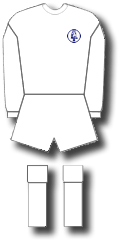
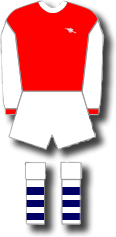 As Leeds United prepared for their Football League Cup final against
Arsenal at Wembley on Saturday 2 March 1968, there were two schools of
thought regarding the outcome. The Doubting Thomases looked back on two
lost finals, a couple of runners up spots in Division One and two defeats
in semi-finals since United's return
to the top flight in 1964, and concluded that Leeds were bottlers,
freezing when their moment came. There was also the little matter of an
incredible 45 matches that United had played thus far in the season, and
another 20-odd still to go, making them understandably a little leg weary.
As Leeds United prepared for their Football League Cup final against
Arsenal at Wembley on Saturday 2 March 1968, there were two schools of
thought regarding the outcome. The Doubting Thomases looked back on two
lost finals, a couple of runners up spots in Division One and two defeats
in semi-finals since United's return
to the top flight in 1964, and concluded that Leeds were bottlers,
freezing when their moment came. There was also the little matter of an
incredible 45 matches that United had played thus far in the season, and
another 20-odd still to go, making them understandably a little leg weary.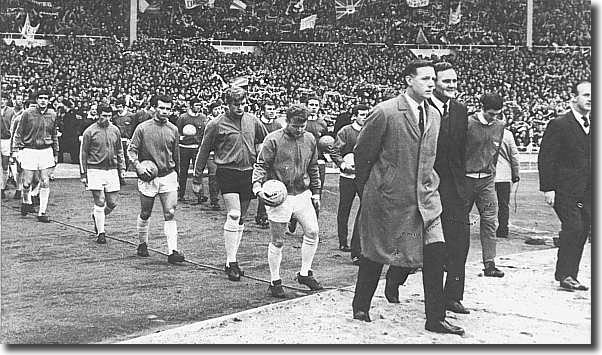 Derby Day."
Derby Day."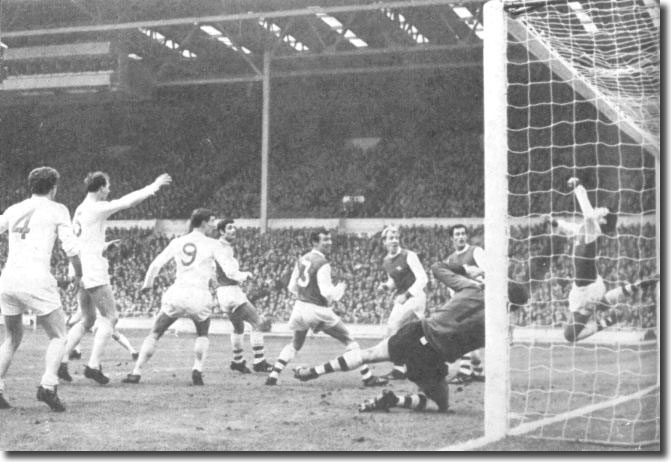 and Derby County.
and Derby County.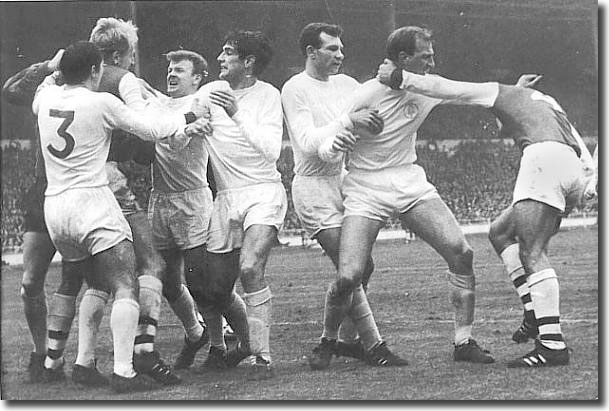 as
he caught the cross, sparking an untidy set to. Ure was surrounded
by Leeds defenders pushing and pulling him in concerted rage.
The referee calmed affairs quickly, but things had threatened
momentarily to get out of hand.
as
he caught the cross, sparking an untidy set to. Ure was surrounded
by Leeds defenders pushing and pulling him in concerted rage.
The referee calmed affairs quickly, but things had threatened
momentarily to get out of hand.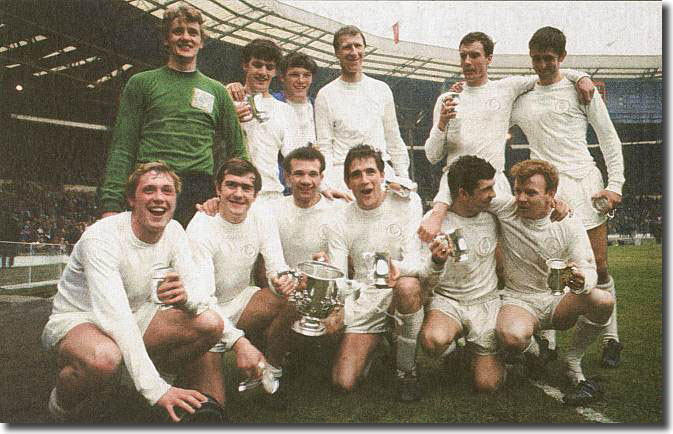 from
Leeds. They did get the ball in the net once, through a shot from
George Armstrong, but the goal was disallowed for an infringement
on Giles.
from
Leeds. They did get the ball in the net once, through a shot from
George Armstrong, but the goal was disallowed for an infringement
on Giles.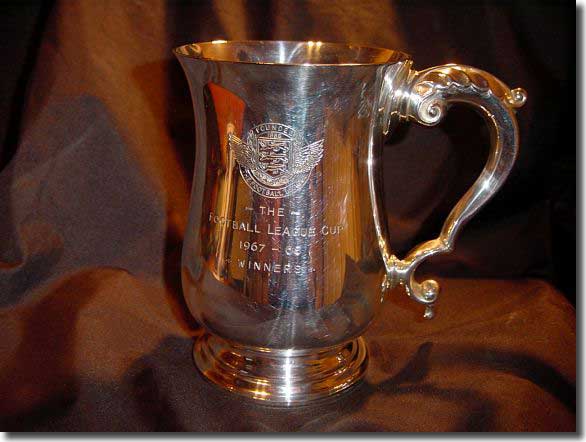 to do most of their shooting from long range and if Cooper's was just
about United's only worthwhile shot on target, Arsenal had not many more.'
to do most of their shooting from long range and if Cooper's was just
about United's only worthwhile shot on target, Arsenal had not many more.'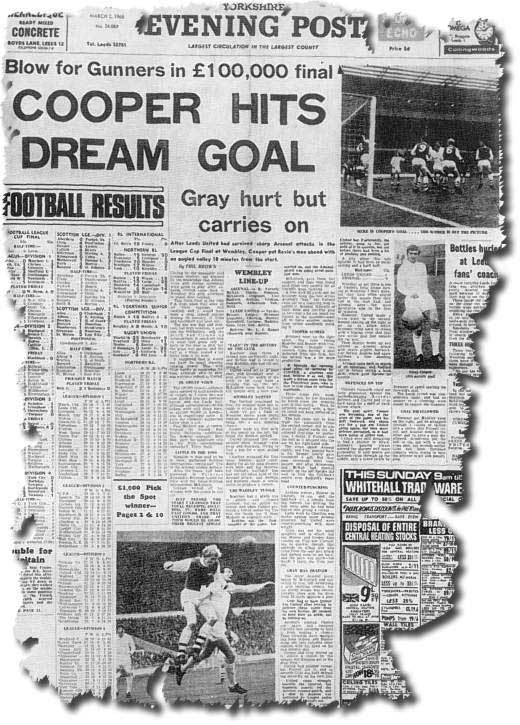 second half, Greenhoff
excepted, they concentrated on defensive matters. Giles, so many times
the architect of Leeds raids, obviously had not recovered fully from his
cold (he did well enough to finish the course) and Madeley was too slow
at centre-forward, although he looked more the part when he became an
auxiliary centre-half.
second half, Greenhoff
excepted, they concentrated on defensive matters. Giles, so many times
the architect of Leeds raids, obviously had not recovered fully from his
cold (he did well enough to finish the course) and Madeley was too slow
at centre-forward, although he looked more the part when he became an
auxiliary centre-half.